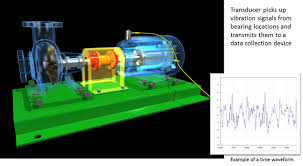Introduction
Machines deteriorate as they get older so we can expect a certain amount of performance falloff and general deterioration of the machine. If we understand the failure mechanisms that are in place we can identify which parameters best indicate the deterioration of the machine.
Failure analysis and Predictive Maintenance techniques, including vibration analysis, are discussed in the course with a view to optimising the maintenance engineering effort while maximising production. Other techniques that will be addressed include infrared thermography, passive ultrasonics, tribology and performance monitoring.
Objectives
At the end of this seminar participants will have:
- An understanding of Machine Failure Analysis techniques
- An understanding of a range of Predictive Maintenance Technologies
- Knowledge of the potential contribution of each these technologies to maintenance efficiency
- Guidelines indicating how these technologies can interact with and support each other
- Hints and Tips for practical application of these technologies so as to achieve the best results
A practical approach to developing an action plan to utilise these technologies in their own areas of responsibility, fitting them into the overall maintenance strategy, and measuring benefits.
Training Methodology
The seminar will be conducted along workshop principles with formal lectures, case studies and interactive worked examples. Relevant case studies will be provided to illustrate the application of each tool in an operations environment. Each learning point will be re-enforced with practical exercises. There will be ample opportunities for discussion and sharing experiences.
Organizational Impact
Analysis of machine failures and predictive maintenance of rotating plant is vital to the budgetary success of the operations organisation. On completion of this seminar, the delegate will be able to critically analyse the methodologies employed within the organisation and instigate improvements where required.
Personal Impact
Technical knowledge is key to effective control and peer respect within any maintenance organisation; when this is achieved personal satisfaction follows. This seminar will give the delegate the required level of technical knowledge and skill to achieve that personal satisfaction.
Who Should Attend?
- Supervisors
- Team Leader and
- Professionals in Maintenance, Engineering and Production
The seminar will also benefit anyone who wishes to update themselves on Predictive Maintenance Technologies and Failure Analysis techniques, as well as those who have to judge the suitability of these technologies for their needs, and learn how to implement them for the benefit of their organisations.
SEMINAR OUTLINE
DAY 1
Understanding Failures
- Machine Failure Analysis
- Wear and tribology
- Fatigue mechanisms
- Plain, tilt-pad and anti-friction bearing and seal failures
DAY 2
Avoiding Failures
- Troubleshooting techniques
- Statistical analysis of machinery failures
DAY 3
Understanding Predictive Maintenance
- Predictive Maintenance Concepts
- Introduction
- Maintenance Strategies
- Predictive Maintenance – background and history
- Predictive Maintenance Technologies – an overview
- Potential Failure Analysis – deciding which technologies to apply
- Vibration Analysis
- Introduction to Vibration Analysis
- Frequency Analysis and the Fast Fourier Transform
- Vibration Transducers
- Basic Failure Mechanisms with examples
DAY 4
Using Predictive Maintenance
- Vibration Standards and Alarm Levels
- Vibration Diagnostics
- Amplitude Demodulation – a.k.a Enveloping, SSE, HFD, Peak-Vue
- Vibration on Rolling Element Bearings
- Resonance – identification & cure
- Other Predictive Maintenance Techniques
- Infrared Thermography
- Thermographic applications
- Passive Ultrasonics - contact and non-contact
- Ultrasonic Applications
- Tribology – oil analysis
DAY 5
Control Mechanisms
- Managing Predictive Maintenance
- Performance and Efficiency Monitoring
- Managing the Predictive Maintenance effort
- Cost Analysis
- Reporting Techniques
- Integrating Predictive Maintenance into the Maintenance Plan

